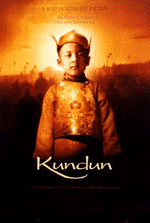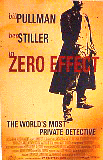
Issue #24/49, October 10 - 22, 1998 
| In This Issue |
 |
| The Search Is Over |
| Class Struggle & Erections? |
| Apocalypse Now |
 |
 |
![]()
Well boys and girls, it seems I've gotten so carried away with the new format in recent weeks that the previously abundant stream of new product has already run dry. There is the presumably predictable but entertaining Lethal Weapon 4 and Spielberg's latest Oscar bid, the Death Porn-heavy war drama Saving Private Ryan, coming in the next two weeks but the local cinemas have conspired to leave me ignorant of these films' respective contents and qualities as we go to print.
Fortunately the English-language video shelves have been better stocked of late than ever before, giving me an out. Which is lucky for you, cuz otherwise I might have resorted to telling one of my unfunny jokes about livestock. You don't want that, believe me.
If you've been paying attention to events in the perekhody, you've probably noticed that a number of worthwhile "classic" films have started appearing in non-translated form, including Sergio Leone's three quintessential spaghetti Westerns from the late '60s. As always with pirated A/V material, the best selection (and prices) can be had at the Gorbushka rynok in Fili Park, metro: Bagrationovskaya, where literally hundreds of English-language videos are available for $5-9. In addition, a number of video kiosks around town are carrying a more limited selection of tapes (typically 20-30 titles at any given time) for slightly higher prices.
One recent releases to make the Moscow journey on tape but not celluloid is Kundun, Martin Scorsese's perplexing entry in the Let's Wax Dalai Lama's Ego sweepstakes. Sadly, the mystification is only of the "why in hell did Marty make this film?" variety. Written and co-produced by frequent Spielberg collaborator Melissa Mathison (the script writer to blame for such squelchy fare as The Indian in the Cupboard, E.T., The Twilight Zone Movie, and The Black Stallion), Scorcese's version on the life of Richard Gere's pet Tibetan is another of those barely two-hour pseudo-epics that make you feel as if you've been sitting on your can for at least three hours by the time it's over.

|
Whatever the background intrigues, the result is a not-very-engaging denaturant of Bernardo Bertolucci's Last Emperor and Little Buddha. The disjointed, episodic structure essentially carves up the central character into a disconnected sequence of the half-dozen or so variously aged actors who portray the leader as he matures to early adulthood. With the hard work so taken care of, the equally incoherent, second-rate minimalism of Philip Glass's score follows along after to pick up the easy spare, mercilessly liquidating whatever narrative flow manages to develop with a persistent lack of imagination and embarrassing impersonation of what Glass apparently imagines Tibetan music to sound like. My question is this: If you're willing to go to the trouble of assembling a primarily Tibetan cast (and quite a large one at that), then why sell yourself short in the all-important sonic department by hiring a black-turtleneck aficionado from Baltimore (especially when an indigenous musician could have provided much more natural and authentic sounds-and without the prima donna attitude that the Andrew Lloyd Webber of mainstream contemporary art music must exude like summertime sweat from the back of a hirsute Samoan)? If there is a bright side to this debacle, it is that hearing Glass's compositions for this film made me realize just how small a stretch the unflattering recent South Park parody of him and his work was.
To be fair, there is decent amount of camerawork that is impressive in and of itself, as well as a few brief sequences carrying genuine emotive force. But these moments are hardly sufficient to maintain the viewer's interest in a film that demonstrates no understanding of the admittedly mystical events and system of beliefs that have produced its opaque and enigmatic hero.
That is, unless you happen to be on the old smack; after all, a Scorsese film will always be a heroin happening, if only to a small degree as is the case with Kundun. Not that this is enough to offset the fact that this sort of thing is definitely not Mr. Sc's bag, baby. Expect better things from his next undertaking, in which Nicholas Cage is rumored to be providing the dramatic juice.
Also available right now pretty much everywhere English-language tapes are sold is an extraordinary little film called Zero Effect. Finding ourselves still awake and with little desire to cash in just yet at 8 o'clock on the Sunday morning of what had been a longer-than-usual weekend, a friend and I decided to watch this particular tape, which he had picked up on a whim a few days earlier and about which neither of us knew a thing.
 |
Later research revealed that Jake is in fact Lawrence's son. At just 22 years of age, the younger Kasdan has already produced four dramatic works for the stage, completed a documentary (about the making of one of his father's projects), and now of course released his first feature film. Ain't it amazing what a little money and influence will do for ya? Hooray for Hollywood, as nobody much says anymore-and probably for good reason.
Boy were we in for a surprise, though-Zero Effect happened to be one of those exhilarating cinematic experiences that leaves you in total and unexpected awe of a film that's at once unique, highly inventive, and expertly fashioned. Furthermore, of the dozen or so people I know who have now seen the movie, not a one emerged from the confrontation without being impressed in a major way. It still seems like cheating to me that Jake never had to pay any dues on the way to his first feature's release, but I have to admit that he delivered the goods in a major way and shows potential for becoming an enduring authorial force that could make his respected father seem like a very mediocre schmoe by comparison. A remarkable debut does not necessarily a successful career make, however... just ask Michael Lehmann. Time will tell, lads... time will tell.
But in the meantime, enjoy the hell out of Zero Effect. Bill Pullman gives a career performance as the brilliant and deranged Darryl Zero. There's one scene in particular with Bill the outlandish detective must pretend to be a mild-mannered accountant, complete with pen, calculator, and deductions worksheets. As he steps into character as the awkward number-cruncher, he undergoes an instantaneous transformation from the raging mental patient we've seen so far into one of his familiar old Singles/Sleepless in Seattle characters, a mind-bogglingly stunning effect. Further on down the line, Ben Stiller is also effective; miraculously, he somehow keeps from being at all annoying. The writing and direction are crisp and unintrusive, casually traversing the gulf separating high suspense from irresistibly absurd comedy with devilish speed and frightening agility.
By the way, chemically conscious video viewers should be aware that Zero Effect would still be every bit as compatible with speed as Scorsese generally is with opiates even if Pullman didn't spend about 90 percent of his off-duty hours in paranoid-psychotic tweak mode. Hoover and drain if you're holdin', but please-everything in moderation. Live to starve another day!

